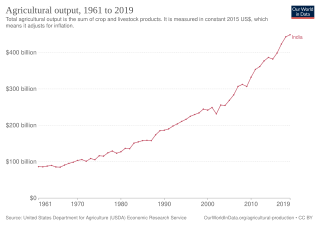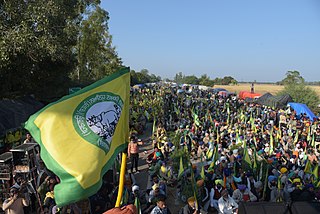Related Research Articles

National Bank for Agriculture and Rural Development (NABARD) is an apex regulatory body for overall regulation of regional rural banks and apex cooperative banks in India. It is under the jurisdiction of Ministry of Finance, Government of India. The bank has been entrusted with "matters concerning policy, planning, and operations in the field of credit for agriculture and other economic activities in rural areas in India". NABARD is active in developing and implementing financial inclusion.

The history of agriculture in India dates back to the neolothic. India ranks second worldwide in farm outputs. As per Indian economic survey 2018, agriculture employed more than 50% of the Indian work force and contributed 17–18% to country's GDP.
The BAIF Development Research Foundation is a NGO based in Urali Kanchan near Pune in Maharashtra, India, that pioneers agricultural development. It was founded in 1967 by Manibhai Desai as the Bharatiya Agro Industries Foundation. Under Manibhai, BAIF pioneered cross breeding of high yielding European cattle such as Holstein Freisian and Jersey with the sturdy Indian breeds such as Gir from Gujarat. Later BAIF expanded the scope of activities to include animal health, nutrition, afforestation wasteland development, and tribal development.

Marpadi Veerappa Moily is an Indian politician belonging to the Indian National Congress from the state of Karnataka.

The Ministry of Agriculture & Farmers Welfare, formerly the Ministry of Agriculture, is a branch of the Government of India and the apex body for formulation and administration of the rules and regulations and laws related to agriculture in India. The three broad areas of scope for the Ministry are agriculture, food processing and co-operation. The agriculture ministry is headed by Minister of Agriculture Narendra Singh Tomar. Abhishek Singh Chauhan, Krishna Raj and Parsottambhai Rupala are the Ministers of State. Sharad Pawar, serving from 22 May 2004 to 26 May 2014, has held the office of Minister of Agriculture for the longest continuous period till date.
The National Commission on Farmers (NCF) is an Indian commission constituted on 18 November 2004 under the chairmanship of Professor M.S. Swaminathan to address the nationwide calamity of farmers suicides in India. The Terms of Reference reflected the priorities listed in the Common Minimum Programme. The NCF submitted four reports in December 2004, August 2005, December 2005 and April 2006 respectively. The fifth and final report was submitted on 4 October 2006. The reports contain suggestions to achieve the goal of "faster and more inclusive growth" as envisaged in the Approach to 11th Five Year Plan and are collectively termed the M.S. Swaminathan report for farmers
National Commission on Agriculture was an Indian Government body that was created to find ways to increase agricultural productivity in India.

The National Food Security Act 2013, also known as Right to Food Act, is an Indian Act of Parliament which aims to provide subsidized food grains to approximately two thirds of the country's 1.2 billion people. It was signed into law on 12 September 2013, retroactive to 5 July 2013.

Pawanexh Kohli is the founding Chief Executive of India's National Centre for Cold-chain Development (NCCD), the premier think-tank in agri-logistics set up in public-private-partnership mode in 2012, and from 2012 to 2020 was the Chief Advisor to Ministry of Agriculture & Farmers Welfare.

The First Ministry of Narendra Modi is the Council of Ministers headed by Narendra Modi that was formed after the 2014 general election which was held in nine phases from 7 April to 12 May in 2014. The results of the election were announced on 16 May 2014 and this led to the formation of the 16th Lok Sabha. The Council assumed office from 27 May 2014.

Ashok Gulati is an Indian agricultural economist and a former chairman of the Commission for Agricultural Costs and Prices (CACP), the advisory body of the Government of India on food supplies and pricing policies. Gulati was instrumental in the hiking the minimum support price of several food grains. Currently he is Infosys chair professor for Agriculture at Indian Council for Research on International Economic Relations (ICRIER). He is also a member of the Task Force on Agriculture set by the prime minister under NITI Aayog and chairman of the Expert Group on Agriculture Market Reforms (2015). He was an active member of the high-level committee set up by the NDA Government to restructure and reorient Food Corporation of India in order to improve its operational and financial efficiency.
The Pradhan Mantri fasal bima yojana (PMFBY) launched on 18 February 2016 by Prime Minister Narendra Modi is an insurance service for farmers for their yields. It was formulated in line with One Nation–One Scheme theme by replacing earlier two schemes National Agricultural Insurance Scheme (NAIS) and Modified National Agricultural Insurance Scheme (MNAIS) by incorporating their best features and removing their inherent drawbacks (shortcomings). It aims to reduce the premium burden on farmers and ensure early settlement of crop assurance claim for the full insured sum.
The 7th Central Pay Commission (7CPC), constituted in February 2014 the principles and structure of emoluments of all central government civilian employees including defence forces in India, submitted its report on 19 November 2015. 7CPC's recommendations affects the organization, rank structure, pay, allowances and pension, of 13,86,171 armed forces personnel. This helps A salary monitoring system is designed to determine and suggest needed changes to the salaries of government employees.page 105, para 6.2.2[3]
The minimum support price (MSP) is an advisory price signal that is part of a larger set of agricultural policies in parts of India. This informal "support" price is recommended by the government and aims to safeguard the farmer to a minimum profit for the harvest while at the same time increasing food security in the country. MSP was initially an incentive for farmers to adopt technology with an aim of increasing the productivity of agricultural land in the 1960s, however in the 2000s it is seen as a market intervention and farmer income scheme. The effectiveness of such a price policy has varied widely between states and commodities. Awareness among farmers of the existence of an MSP is poor at 23%, while awareness of MSP procurement agencies is also poor with only about 20-25% of wheat and paddy produce being sold at MSP.
Pradhan Mantri Kisan Samman Nidhi is an initiative by the government of India that give farmers up to ₹6,000 (US$75) per year as minimum income support. The initiative was announced by Piyush Goyal during the 2019 Interim Union Budget of India on 1 February 2019. The scheme has cost ₹75,000 crore per annum and came into effect December 2018.
Sir Purshottamdas Thakurdas (1879–1961),, was a Gujarati cotton trader, mill owner, businessman and industrialist from Mumbai, India. He was one of the signatory of Bombay Plan, which was set of proposals for the post-independence economy of India. He along with GD Birla established Federation of Indian Chambers of Commerce & Industry in 1927 on the advice of Mahatma Gandhi. He was a member of the Hilton Young Commission.He was a member of the Acworth Committee. He headed the Foodgrain Policy Committee of 1947.
The Department of Agriculture and Farmers' Welfare (DA&FW) is one of the three constituent department of Ministry of Agriculture and Farmers' Welfare, the other two being Department of Agriculture Research and Education (DARE) and Department of Animal Husbandry and Dairying. The Department is headed by Minister of Agriculture and Farmers' Welfare.

The Indian agriculture acts of 2020, often termed the Farm Bills, were three acts initiated by the Parliament of India in September 2020. The Lok Sabha approved the bills on 17 September 2020 and the Rajya Sabha on 20 September 2020. The President of India, Ram Nath Kovind, gave his assent on 27 September 2020.

The 2020–2021 Indian farmers' protest was a protest against three farm acts that were passed by the Parliament of India in September 2020. The acts, often called the Farm Bills, had been described as "anti-farmer laws" by many farmer unions, and politicians from the opposition who said that it would leave farmers at the "mercy of corporates". The protests were largely non-violent. The protests also demanded the creation of a minimum support price (MSP) bill, to ensure that corporates cannot control the prices. The union government, however, maintained that the laws would make it effortless for farmers to sell their produce directly to big buyers, and stated that the protests are based on misinformation. Related endemic legacy issues include farmer suicides and low farmer incomes. Despite India being largely self-sufficient in foodgrain production and having welfare schemes, hunger and nutrition remain serious issues, with India ranking as one of the worst countries in the world in food security parameters.
References
- ↑ "Govt pursuing target of doubling farmers' income by 2022: Tomar". The Economic Times. PTI. 9 February 2021. Retrieved 25 November 2021.
- ↑ Kumar, Shiv; Chahal, V. P. (January 2018). "Doubling farmers' income: possible way out" (PDF). Indian Farming. 68 (1): 95–96.
- ↑ Jadhav, Radheshyam (10 May 2021). "Doubling farmers' income: It's still a long road ahead". The Hindu BusinessLine. Archived from the original on 9 May 2021. Retrieved 25 November 2021.
- 1 2 "Doubling farmers' income: Dalwai committee empowered to oversee implementation". The Financial Express. 4 January 2019. Archived from the original on 4 January 2019. Retrieved 26 November 2021.
- 1 2 3 4 Gulati, Ashok; Hussain, Siraj (28 August 2017). "From plate to plough: Tall tales for farmers". The Indian Express. Archived from the original on 27 August 2017. Retrieved 25 November 2021.
- ↑ March of Agriculture since Independence and Growth Trends. Historical Analysis and Examination of India's Agricultural Production and Farmers' Income (PDF). Report of the Committee on Doubling Farmers’ Income. Vol. 1. Committee on Doubling Farmers' Income, Department of Agriculture, Cooperation and Farmers’ Welfare, Ministry of Agriculture & Farmers' Welfare. August 2017. pp. ii.
- ↑ Satyasai, K J S; Mehrotra, Nirupam (12 July 2016). "Enhancing Farmers' Income" (PDF). Lead paper prepared for Foundation Seminar in Vigyan Bhavan, New Delhi on 12 July 2016 on Doubling Farmers' Income by National Bank for Agriculture and Rural Development (NABARD). Archived (PDF) from the original on 9 August 2017 – via Department of Agriculture & Farmers Welfare, Ministry of Agriculture and Farmers' Welfare, Government of India.
- ↑ Chand, Ramesh (15 April 2016). "Why doubling farmers' income by 2022 is possible". The Indian Express. Archived from the original on 18 April 2016. Retrieved 26 November 2021.
- 1 2 3 Satyasai, K J S; Bhart, Sandhya (March–April 2016). Department of Economic Analysis and Research, NABARD. "Doubling Farmers' Income : Way Forward". Rural Pulse. XIV– via researchgate.net.
- ↑ Bihari, Bankey; Singh, Madan; Bishnoi, Rajesh; Mishra, P K (August 2019). "Issues, challenges and strategies for doubling the farmers' income in India- A review". Indian Journal of Agricultural Sciences. 89 (8): 1219–1224. doi:10.56093/ijas.v89i8.92830. S2CID 254525929 – via researchgate.net.
- ↑ Comprehensive Policy Recommendations. Summation of Recommended Reforms and Implementation Items Covering Topics discussed in all Volumes of the DFI Report (PDF). Report of the Committee on Doubling Farmers’ Income. Vol. 14. Committee on Doubling Farmers' Income, Department of Agriculture, Cooperation and Farmers’ Welfare, Ministry of Agriculture & Farmers' Welfare. September 2018.
- ↑ Nirmal, Rajalakshmi (1 October 2019). "We're on track to doubling farmers' income: Ashok Dalwai". The Hindu BusinessLine. Archived from the original on 1 October 2019. Retrieved 25 November 2021.

